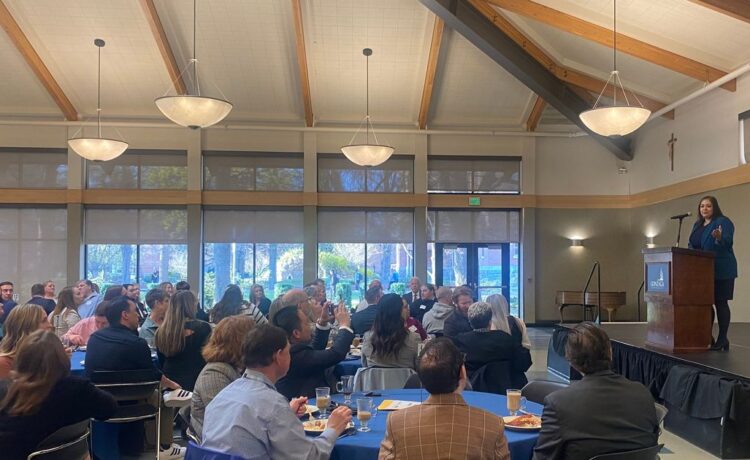Dann Babcox is bored.
And he loves it.
Babcox, 30, graduated from Spokane County Drug Court in January, and for the first time, he’s not in crisis mode.
Not long ago, Babcox was sitting in a suicide watch cell in the Spokane County Jail. It was the culmination of years of drug use starting when he was a teenager. His mother’s death from cancer only made the problem worse, and he didn’t see a way out. Sitting in that cell, Babcox made the decision to change.
“It was something that I just finally felt ready to do,” Babcox said.
He voluntarily enrolled in drug court, a program that gives people charged with certain crimes the opportunity to be supported through treatment, and if they can maintain sobriety, among other requirements, get their charges resolved without a conviction on their record.
On Wednesday, Babcox shared his story with dozens of local judges, attorneys, legislators and community members at the first Spokane Therapeutic Courts Foundation fundraiser in nearly five years.
The foundation fills the gaps left by health insurance, or state and grant funds for people enrolled in mental health and drug court.
Drug court has up to 75 participants at a time and is a minimum of one year, while mental health court takes up to 50 participants for a minimum of two years, said Lindsay Lanham, who coordinates the programs. The recidivism rate hovers under 15% in comparison to the over 75% for offenders with addiction, according to the court.
Participants must get substance use and mental health treatment, maintain sobriety, get their GED or high school diploma, work and maintain sobriety to graduate the program.
The court offers six months of housing support, along with helping participants get health insurance and a primary care doctor. All services are free to participants.
Often people in the program haven’t had consistent medical care and need supports to get physically healthy, Lanham said. There are gaps, though, and the foundation often pays for glasses for participants if it’s not covered by health insurance.
About 80% of people in the program start out unhoused, Lanham said. Typically, they will enter inpatient treatment, then move to a sober living facility before transitioning to their own apartment.
The foundation contracts with Goodwill so that anyone in the program can go purchase clothes and other items with the bill going to the foundation. When people move into their own apartments, the foundation also helps with basics like a mattress, Lanham said.
Babcox enrolled in treatment and then moved into sober living at Oxford House. He was doing so well, his sister offered to let him move in with her as his next step to stability, Babcox said with pride.
In the years prior, he had spent a handful of hours with his family each year.
“Because I didn’t like being around my family while I was in active use,” he said.
Now, he talks to his siblings frequently and beams when he tells people he lives with his sister.
“I felt very proud,” he said of being offered a place in her home.
Babcox now works at Jewels Helping Hands helping others through homelessness and addiction. He is thinking about going back to school.
The Wolff Family Foundation made a substantial donation to help start the Julie Morris Therapeutic Court Alumni Scholarship, announced Harold Clarke III, a recently retired superior court judge and foundation board president. Morris, a former foundation board member, died suddenly last year.
The scholarship, Clarke said, would help with some of the hidden costs of higher education or vocational education programs, like application fees. The hope, he said, is to support people beyond sobriety and into thriving.
“Drug court or mental health court really gives people their life back,” Lanham said. “The foundation provides the money to give people hope.”














